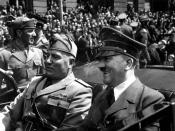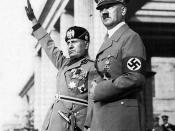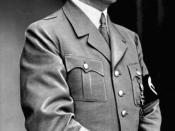"...Instead of working to achieve power by an armed coup we shall have to hold our noses and enter the Reichstag against the Catholic and Marxist deputies. If outvoting them takes longer than outshooting them, at least the results will be guaranteed by their own Constitution! Any lawful process is slow. But sooner or later we shall have a majority - and after that Germany."Adolf Hitler stated the above while he was serving his sentence for the Munich Beer Hall Putsch in Landsberg Prison. This statement signified his dramatic changes in his policies for his attempts to become the leader of Germany. Before the sentencing, he wished to use a coup to take control of the German government, but the Nazi's failure of the Beer Hall Putsch imparted him a great lesson- that the only approach for the Nazis and himself to capture Germany was by the democratic process, elections.
Approximately 4 years later in the German election of 1928, the Nazis only gained 2.6% of the popular vote and a total of 12 representations seats in the Reichstag, which was actually a decrease from 14 seats in December of 1924. Hitler's support jumped from 6000 members to 55,000 members in 1923, and yet their support did not similarly ascend exponentially between 1924 and 1929. Hitler didn't have support of the mass population between 1924-1929 because of the improvement of the German economy between 1924 and1929, the social stability between this period, and the political limitations and reorganization of the Nazi Party during this period of time.
The first reason why Hitler did not have support between 1924 and 1929 was because of the dramatic recovery of the German economy from the hyper-inflations and the unemployment after World War One. The German floating debt was about 191 trillion marks...



Hitler
I don't think you mentioned this, but before/during/ and just after world war one Hitler was not a democrat, he was nothing more than a soldier, and after world war one, he chose to run for leader of Germany. In 1924 Hitler, was still only entering politics, and only had just left the army, his campaign was excavated 3 years before world war two, after his impressive speech in Berlin, Germany.
4 out of 4 people found this comment useful.